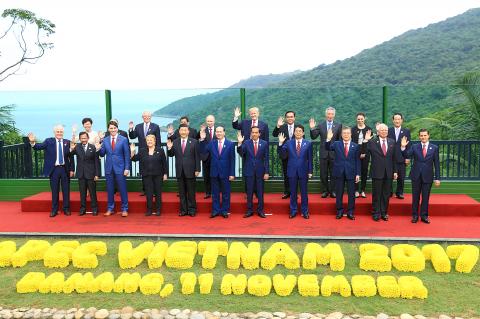A blockbuster Pacific trade pact abandoned by US President Donald Trump has edged closer to becoming reality after days of tense talks in Vietnam.
Japanese Minister of the Economy Toshimitsu Motegi said the 11 remaining members of the Trans-Pacific Partnership (TPP) have secured a framework agreement on how to salvage the deal.
Canada, which held out for a day on signing onto the agreement, said it had won some desired concessions while adding that work is needed to reach a full deal.

Photo: AFP
Motegi spoke to reporters in Da Nang late on Friday, after ministers held another meeting and confirmed the content of the broad agreement, which includes sections to be suspended after the US withdrawal earlier this year.
“We reconfirmed the agreement from yesterday [Thursday], including all the details of the wording used,” Motegi said.
“There’s no mistake,” he said, referring to initial claims from Japan on Thursday that a deal had been struck that were disputed by other countries, causing confusion. “No changes were made to the text.”
Canadian Minister of International Trade Francois-Philippe Champagne defended the delay, saying he had refused to be rushed into an agreement on what he now called the “Comprehensive Progressive TPP.”
The frictions in talks — which saw the Vietnamese trade negotiator walk out late on Thursday night in frustration — had raised concerns that the deal might collapse.
“What we’ve been able to achieve is to preserve market access in Japan, we’ve been able to improve the progressive elements and we’ve also been able to suspend key sections like intellectual property which our Canadian stakeholders thought would have an impact on innovation,” Champagne said.
“We made progress, but we clearly identified the things we still need to work on,” he said. “We have a framework that has been established, so in the sense that we know the elements that people wanted to preserve.”
The TPP, which would have covered 40 percent of the global economy, was thrown into disarray when Trump withdrew the US in one of his first acts as president due to a perceived risk to US jobs, leaving other countries scrambling to keep the deal alive.
The TPP was seen as a hallmark of US engagement with Asia under the prior administration and a buffer against China’s rising clout.
Meanwhile, Liu Meng-chun (劉孟俊), an economist at Taiwan’s Chung-Hua Institution for Economic Research (中華經濟研究院), yesterday said the nation must find a way to join the TPP, and that it must avoid becoming marginalized while also seeking to strengthen its trade relationship with the US.
With the withdrawal of the US, Japan is to take over its leadership role within the TPP, he said, adding that it remains to be seen whether Japan can convince other TPP members to allow Taiwan to be part of the agreement.
Liu said he hopes that Taiwan’s Representative to Japan Frank Hsieh (謝長廷) can speed up efforts to join the agreement.
Vietnam, where several Taiwanese business interests are concentrated, is a TPP member, which could add leverage to Taiwan’s bid for membership, Liu added.
Additional reporting by CNA

US President Donald Trump yesterday announced sweeping "reciprocal tariffs" on US trading partners, including a 32 percent tax on goods from Taiwan that is set to take effect on Wednesday. At a Rose Garden event, Trump declared a 10 percent baseline tax on imports from all countries, with the White House saying it would take effect on Saturday. Countries with larger trade surpluses with the US would face higher duties beginning on Wednesday, including Taiwan (32 percent), China (34 percent), Japan (24 percent), South Korea (25 percent), Vietnam (46 percent) and Thailand (36 percent). Canada and Mexico, the two largest US trading

AIR SUPPORT: The Ministry of National Defense thanked the US for the delivery, adding that it was an indicator of the White House’s commitment to the Taiwan Relations Act Deputy Minister of National Defense Po Horng-huei (柏鴻輝) and Representative to the US Alexander Yui on Friday attended a delivery ceremony for the first of Taiwan’s long-awaited 66 F-16C/D Block 70 jets at a Lockheed Martin Corp factory in Greenville, South Carolina. “We are so proud to be the global home of the F-16 and to support Taiwan’s air defense capabilities,” US Representative William Timmons wrote on X, alongside a photograph of Taiwanese and US officials at the event. The F-16C/D Block 70 jets Taiwan ordered have the same capabilities as aircraft that had been upgraded to F-16Vs. The batch of Lockheed Martin

GRIDLOCK: The National Fire Agency’s Special Search and Rescue team is on standby to travel to the countries to help out with the rescue effort A powerful earthquake rocked Myanmar and neighboring Thailand yesterday, killing at least three people in Bangkok and burying dozens when a high-rise building under construction collapsed. Footage shared on social media from Myanmar’s second-largest city showed widespread destruction, raising fears that many were trapped under the rubble or killed. The magnitude 7.7 earthquake, with an epicenter near Mandalay in Myanmar, struck at midday and was followed by a strong magnitude 6.4 aftershock. The extent of death, injury and destruction — especially in Myanmar, which is embroiled in a civil war and where information is tightly controlled at the best of times —

China's military today said it began joint army, navy and rocket force exercises around Taiwan to "serve as a stern warning and powerful deterrent against Taiwanese independence," calling President William Lai (賴清德) a "parasite." The exercises come after Lai called Beijing a "foreign hostile force" last month. More than 10 Chinese military ships approached close to Taiwan's 24 nautical mile (44.4km) contiguous zone this morning and Taiwan sent its own warships to respond, two senior Taiwanese officials said. Taiwan has not yet detected any live fire by the Chinese military so far, one of the officials said. The drills took place after US Secretary